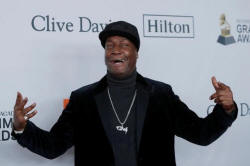All the right notes: First jobs of famous musicians
 Send a link to a friend
Send a link to a friend
 [June 01, 2018]
By Chris Taylor [June 01, 2018]
By Chris Taylor
NEW YORK (Reuters) - Without music, life
would be a mistake, according to the German philosopher Friedrich
Nietzsche.
Yet some of the world's most famed musicians did not begin their careers
belting out hits onstage. They had to endure scrappy jobs, just like the
rest of us.
For the latest in Reuters' "First Jobs" series, we talked to a few
notable music makers about the gigs that got them started.
Grandmaster Flash
First job: Delivery boy
"I got a job as a delivery boy for a fabric store at Broadway and 38th
St. I was walking around the garment district looking for work, and
luckily I met the owner of that company, who needed someone to deliver
swatches around Manhattan.
"I don't even want to remember how much they paid me – probably around
$150 a week. But that money went towards buying my first turntables. I
had seen them in the window of an electronics store in the Hunts Point
section of the Bronx, and they cost $75 apiece. I had to do a lot of
deliveries for that money.
"These were the first turntables that had enough torque, to put my
fingertips on the record and start repeating the breaks, all this stuff
I was envisioning in my head. That was the beginning of rap music.

"I still have those turntables. What I learned from that time: what is
in your head may be what the world is waiting for – so see it through."
Lars Ulrich, Metallica
First job: Clubhouse attendant
"I grew up in a tennis-playing family, and we all belonged to a club in
Copenhagen, Denmark. In that clubhouse was a little café, and the
earliest job I can remember doing was tending to that counter, giving
people Coca-Colas and sparkling waters, and diving into the freezer for
popsicles and ice-cream bars.
"They did pay me, but it was more of a social thing, because from the
age of 10 to 15 I was hanging out there every day after school anyways.
My paycheck was enough to sustain an occasional trip into the heart of
Copenhagen, to buy records by artists like Bob Marley, Kiss, Thin Lizzy
and Judas Priest.
"I remember being amused looking at my paycheck, because I would make
something like 175 Danish kroner, and then they would take out like 46
percent in taxes. I was bewildered by that, because at 12 years old I
didn't understand any of that stuff.
"I was pretty good at tennis, since for a while my dad was the best
player in Denmark. At one time the Danish Davis Cup team consisted of my
dad, my uncle, and my grandfather. I ranked in the top 10 for my age
group in Denmark. But then we moved to Newport Beach, California, and I
didn't even make the local high school team. I wasn't even in the top 10
on my street."
[to top of second column] |

Grandmaster Flash
attends the 2018 Pre-GRAMMY Gala & GRAMMY Salute to Industry Icons
presented by Clive Davis and The Recording Academy honoring Shawn
"JAY-Z" Carter in Manhattan, New York, U.S., January 27, 2018.
REUTERS/Andrew Kelly

MC Ren, NWA
First job: McDonald's
"I was in the 10th grade, trying out for the football team, and after three
practices I got a call from McDonald's. I had to quit the team, because I wanted
to make some money. I was only 15, but I actually lied on my application and
said I was 16.
"I stayed there for a year, flipping burgers and mopping floors. Then I went to
Popeyes, and I thought I was really moving up in the world. I got paid a little
more because my homeboy was a manager there. Nobody really knew I was trying to
rhyme, though.
"I worked for Popeyes six months, and then after I graduated was when everything
started cracking. I started kicking it with Eazy-E all the time, and then NWA
blew up.
"The lesson from that job is that if you want to get paid, you got to work for
it -- whether it's music, or McDonald's. You can't sit around. Get up and go get
it."
Nancy Wilson, Heart
First job: Restaurant singer
"I tried to be a car mechanic, then a restaurant hostess, and then a dishwasher,
but I kept striking out. A local restaurant in Bellevue, Washington called The
Thunderbird was looking for a singer to do live sets, so I started doing
acoustic sessions there.
"It was terrifying. I had done stuff with my sister Ann in living rooms and
church groups and even drive-in movie theaters, but never anything by myself.
They didn't pay me much, but whatever I earned went towards buying records and
getting a better guitar.
"I would sit in the corner, with my mic and miniature PA system, and try to take
requests. People would ask for stuff like Led Zeppelin, Jethro Tull, The Beatles
and The Moody Blues.

"Unfortunately they always asked for Don McLean's 'American Pie'. It's one of
those campfire-type songs with a million verses. Lo and behold, every single
time someone would request it. I still haven't recovered to this day."
(The writer is a Reuters contributor. The opinions expressed are his own.)
(Editing by Lauren Young)
[© 2018 Thomson Reuters. All rights
reserved.] Copyright 2018 Reuters. All rights reserved. This material may not be published,
broadcast, rewritten or redistributed.
Thompson Reuters is solely responsible for this content. |